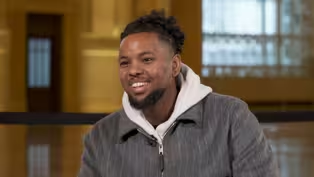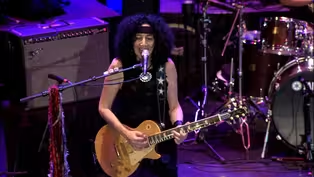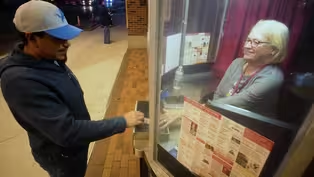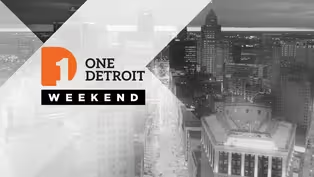
New documentary “Islam’s Greatest Stories of Love” explores how to heal after losing love
Clip: Season 10 Episode 8 | 6m 18sVideo has Closed Captions
One Detroit’s Chris Jordan spoke to Ariella Gayotto Hohl about making the film
“Islam’s Greatest Stories of Love” is a new documentary following Ariella Gayotto Hohl’s journey as she processes grief after her father’s death. The film explores how to heal after losing love. Gayotto Hohl travels the world and interviews members of the Muslim community about their cultural understanding of love and grief.
Problems playing video? | Closed Captioning Feedback
Problems playing video? | Closed Captioning Feedback
One Detroit is a local public television program presented by Detroit PBS

New documentary “Islam’s Greatest Stories of Love” explores how to heal after losing love
Clip: Season 10 Episode 8 | 6m 18sVideo has Closed Captions
“Islam’s Greatest Stories of Love” is a new documentary following Ariella Gayotto Hohl’s journey as she processes grief after her father’s death. The film explores how to heal after losing love. Gayotto Hohl travels the world and interviews members of the Muslim community about their cultural understanding of love and grief.
Problems playing video? | Closed Captioning Feedback
How to Watch One Detroit
One Detroit is available to stream on pbs.org and the free PBS App, available on iPhone, Apple TV, Android TV, Android smartphones, Amazon Fire TV, Amazon Fire Tablet, Roku, Samsung Smart TV, and Vizio.
Providing Support for PBS.org
Learn Moreabout PBS online sponsorship(upbeat music) - You are the host, co-producer, and co-writer of "Islam's Greatest Stories of Love."
Tell me a bit about the film.
- "Islam's Great Stories of Love" is a two-hour film that deals with my personal journey as someone who had lost my father in the middle of a process of trying to understand questions of love.
So the movie's a lot about how do we make sense of love after losing it and after being broken by it?
So we go on this journey with me, which was very fresh.
We started filming only a couple of months after I lost him.
And we were talking to people about these five great stories of love from the Muslim tradition, that really shaped the way that we understand love in Islam.
- What did you find, and how did it help you answer those questions?
- There were two things that are my main takeaways from going on this journey.
The first one is what became also the tagline of the film.
Love is more than an emotion.
It is a force.
How love pushes people to do things that otherwise they wouldn't be able to do.
Maybe the love of a parent that gives them strength, the strength to continue a mission or the strength to be there for each other or to believe in ourselves.
And the second one that I've been thinking a lot about lately too, is that love is not just something that we feel.
It's also a value that we choose to be grounded in every day.
- Tell me a bit about your academic background and kind of how that informed the film, as well as your personal story that you mentioned.
- So I was at Divinity School when all of this started.
So I started my work more focused on Islamic studies in general.
And I wanted to explore these stories that are not so often told within the Muslim community.
And I realized the power of storytelling for others to be able to see themselves and to be able to live their lives more openly and to find legitimacy in the connection with others as well.
So smack in the middle of my, of that work when I was studying, I lost my dad.
And then intellectually, there was a very big shift for me.
I went from looking at things more in the big picture, to exploring these very real questions.
And because my dad was also a photographer, exploring that through a film medium was something that was really special to me personally.
- And within the film, how do you tell these stories?
- So what I love about the way we tell these stories, it's that these are stories that are very obvious for many Muslim audiences.
They are stories that are very much part of our collective memory and our collective understanding of love.
So you have stories from the prophet Khadija, who we still look into and emulate to this day, who really changed the story of Islam through their partnership and through everything they went through together.
We have stories like the Taj Mahal, which is a very common like the people who know about, but what's really special about the way that we tell these stories is that we looked at them specifically from a lens of love and we looked at them from a very personal lens.
So the beauty about the film is that we're getting to tell these stories in a novel way, but because it's so focused on the universal experience of love and loss and grief, it feels very universal at the same time.
- One of the stories that is in the film is the story of Malcolm X and his sister.
And that's a story that's gonna be particularly significant to many viewers here in Detroit, because that story does touch on Detroit and on Lansing where Malcolm X spent time.
- Yeah, it's one of my favorite stories.
And to be honest, it was the one that I was the most surprised about because as much as I know of Malcolm X, as you know, an obvious figure of radical love that really changed the civil rights movement in the US, I never knew about the role that his sister, Ella Collins, had in his life.
So this particular story we tell from the perspective of these two siblings that were there for each other and specifically Ella, his sister's love for him, that allowed him to become the Malcolm X that we know today.
So there is this beautiful bond that we got to explore through the movie and through the conversations that we had, about what is the meaning of unconditional love, of being there for someone, even when you don't believe in the path that they're going, or even when you can see what's ahead of them, but they can't?
And how do we do that in a way that still uplifts them and allows them to be the best version of themselves?
When we start talking about his rise in the Nation of Islam after he's incarcerated, that Detroit becomes the center of his story.
Detroit is really where they have the first temple of the Nation of Islam.
That's where he develops his relationship with Elijah Muhammad.
You know, Detroit is one of the most important cities in the US for Muslims, right?
It's where many of us are.
And I think getting the chance to share something that is in our cultural and religious context with the world in these broader, in this broader lens, I think will be very special.
I think people will get a little bit of a glimpse of what love looks like in our communities, but then also be able to take away some lessons from themselves, for to be able to heal and to understand love in their own way.
Video has Closed Captions
Clip: S10 Ep8 | 1m 43s | Detroiter Abdulrahman Abdinur participates in One Detroit’s “Destination Detroit” series. (1m 43s)
Latina singer and guitarist Eljuri performs in this year’s Concert of Colors
Video has Closed Captions
Clip: S10 Ep8 | 3m 8s | Detroit PBS’ “Best of Concert of Colors” features Ecuador-born singer, songwriter and guitarist Elju (3m 8s)
Local independent movie theaters finding new ways to stay open
Video has Closed Captions
Clip: S10 Ep8 | 9m 28s | One Detroit’s Chris Jordan and Bill Kubota visit some of metro Detroit’s remaining movie theaters. (9m 28s)
Things to do around Detroit this weekend: August 22, 2025
Video has Closed Captions
Clip: S10 Ep8 | 1m 49s | The Dragon on the Lake Festival, Novi Taco Fest and other fun events happening around Metro Detroit (1m 49s)
Providing Support for PBS.org
Learn Moreabout PBS online sponsorship
- News and Public Affairs

Top journalists deliver compelling original analysis of the hour's headlines.

- News and Public Affairs

FRONTLINE is investigative journalism that questions, explains and changes our world.












Support for PBS provided by:
One Detroit is a local public television program presented by Detroit PBS



